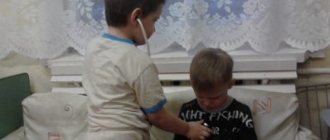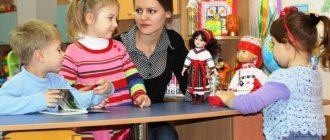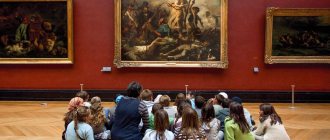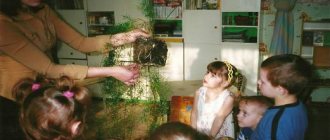Directions of moral development of a younger preschooler
In early preschool age, the development of the body’s mental processes occurs. The child’s capabilities expand: he can independently perform various household operations and master self-service skills. In addition, his social contacts are expanding: the child enters a preschool educational institution, where he interacts with new adults, as well as a group of peers. This requires focusing on developing the foundations of social interaction and establishing positive contacts.
Are you an expert in this subject area? We invite you to become the author of the Directory Working Conditions
The moral development of a younger preschooler is implemented in the following areas:
- Formation of elementary moral ideas. They affect the basics of behavior, its norms, ideas about good and evil, good and bad, right and wrong. The teacher introduces children to different situations and the behavior of their participants, analyzing their moral meaning and significance.
- Formation of the foundations of a culture of behavior. It requires mastering the rules of etiquette, showing politeness and tolerance towards other people. Here, the basics of cultural behavior in everyday life, in play and other activities of the child are mastered.
- Development of the basics of independent activity. They are necessary for the formation of one’s own views and beliefs, and the development of a worldview. Independence develops in everything: from self-service to the performance of various educational and work tasks.
- Formation of moral interaction with adults. Children are taught to respect their elders, listen to them, follow their instructions, and be polite. It is explained to children that an adult requires the child to do something for his own good, and not because he is an authority and does not take into account the child’s opinion.
- Active development of the sensual side of the personality. Children are taught to show their feelings and express them adequately. Emerging feelings and emotions must be manifested in real action. Otherwise, their development is pointless.
- Giving a humanistic orientation to the behavior of a preschooler. There is learning to establish positive social contacts, the formation of the habit of performing actions according to moral principles, the skills of moral interaction with the outside world and their predominance in any area of activity are developed.
Finished works on a similar topic
Course work Moral education of children of primary preschool age 460 ₽ Abstract Moral education of children of primary preschool age 260 ₽ Test work Moral education of children of primary preschool age 190 ₽
Receive completed work or specialist advice on your educational project Find out the cost
Moral education of children of primary preschool age
One of the most important periods for the development of moral qualities and ideas is the early preschool age from two to four years. At this age, children are most susceptible to educational influence; in early preschool age, basic moral concepts about good and bad, behavioral skills, as well as a good attitude towards others are formed. The most favorable environment for the development of moral qualities is created through the cooperation of family and kindergarten. The basis for a child’s future moral development is the moral feelings, ideas, skills and experiences formed in preschool childhood.
When a child enters kindergarten, his usual way of life changes; he has more contact with other adults and children. Thanks to this, role-playing game gradually develops, he is included in systematic and compulsory group activities (educational activities), takes part in games with other children (games with rules, story-based and role-playing games, etc.), as well as , carries out work assignments of the teacher. As children develop in kindergarten, they must learn new and more complex rules aimed at interacting with peers and adults who will regulate their behavior.
In the third year of life, a child experiences an age-related crisis, during which he has a lot in common with children of the previous age group, but new mental formations appear that allow him to master more complex skills, form new ideas and contribute to the accumulation of personal experience of behavior and activity. At the same time, a more attentive and careful attitude is required to form the correct knowledge and ideas about moral behavior. The “Program of Education in Kindergarten” states that children from two to three years old are characterized by an active focus on performing actions without the help of an adult, the manifestation of elementary types of verbal judgments about the environment, the formation of new forms of relationships, a gradual transition from solitary games and games nearby to the simplest forms of joint play activities. [1; 69]
At the next age level, the child has a great need for adult attention and affection. In many ways, they are still dependent on their elders; this is due to the children’s lack of basic self-care and hygiene skills, the ability to play, study independently, and incompletely developed communication skills with others.
Therefore, one of the main tasks of raising children of primary preschool age is the formation of independence in everyday life, play and educational activities. Children must learn to do independently what they can do and what is consistent with their life experience. Thanks to this, children can not only take care of themselves, but also maintain order in the environment, that is, manage their behavior, observing a number of rules and without resorting to the help of an adult.
A teacher can place higher demands on three-year-old children, because by this age children have increased independence, which means they can have more contact with peers, doing errands, organizing joint play, and so on, taking into account the interests and desires of others. By including children in individual and joint activities, the teacher trains them in good deeds, develops humane feelings, makes them want to obey, and treat others with respect (the teacher, nanny and peers). Thus, the teacher develops in children of this age the ability to say hello, politely address elders and comrades, thank them, play joint games, taking into account the interests and desires of others, without interfering with their peers in play activities, take care of their own and other people’s things, calmly wait until their comrades finish your hygiene procedures. [3; 184]
To implement the tasks of moral development, the teacher uses imitation as a feature of children two to four years old. That is, by his own example, he shows children an example of correct and cultural behavior with a positive attitude towards others and work. This is facilitated by the greater emotional responsiveness to actions and attitudes towards them that is characteristic of children of primary preschool age. It is very important that the teacher maintains a positive emotional state in the children: responsiveness to his proposal, request, a sense of empathy when seeing the grief of another. Children are taught to love their loved ones and to want to do something good for them. This is achieved through adults’ approval and praise of the child’s manifestations of kind feelings towards others. [2; 158]
In the fourth year of life, the teacher continues to develop in children a good and kind attitude towards others, the desire to be kind and cultured, and also develops a conscientious attitude towards their actions and the ability to evaluate them.
One of the most important educational tasks is the development of friendly relationships and communication between children. Previously, it was only the task of maintaining joy when communicating with comrades. At the same time, the teacher teaches children to notice violations of the rules of relationships (took away a toy, hit, and so on). [4; 133]
From the age of three, the desire to communicate with other children increases; at this age, children already become good co-players, since they have already begun to understand the actions and speech of their comrades, explain their point of view, and agree on a joint game or some activity.
All this obliges the teacher to develop in children of the second youngest group the ability to treat younger preschoolers kindly, at the request of an adult, to take care of a newcomer, of children who come after illness, to teach another what he can do himself. In games, in everyday communication with peers, children, imitating adults, show mutual attention, care, and politeness.
Due to the behavioral characteristics of children of primary preschool age (lack of self-control, inability to timely and correctly follow the rules of behavior) [1; 58], the child may have a contradiction in his desire to obey certain requirements of the teacher. At the same time, children are very attentive to the words of adults, especially when they are said in the right convincing tone. Thanks to this, children are encouraged to act in accordance with the requirements and rules of behavior.
An important role in the formation of skills and habits of cultural behavior is played by the child’s motivation, which contributes to the establishment of unity between external forms of cultural behavior and his moral motives. For example, four-year-old children can carry out basic instructions from adults, based on the rules of behavior, they begin to understand the simplest motives for the significance of their work for society. This obliges the teacher to organize any activity of children in such a way as to form a motive of interest in the matter, the desire to earn the approval of others, and also to form moral motives (to be needed by others).
The interaction between kindergarten and family plays an important role in the moral development of younger preschoolers. The organization of pedagogically valuable everyday communication, as well as accessible joint activities of the child with adults and peers, is much more successful in forming stable habits of correct behavior, in accordance with generally accepted rules, the culture of behavior and relationships reaches a new level and manifests itself differently than before. [5;82]
The children develop ideas about caring for plants and animals. They begin to understand that they need to responsibly treat and care for animals, birds and plants, and also try to actively participate and help adults in such matters.
Children begin to understand that the adults around them care about them, that they feel good and comfortable at home and in kindergarten, and for this they need to be careful about the work of adults and come to the rescue whenever possible. Seeing an example before them, they begin to treat their work and the work of their comrades in the same way.
By mastering these concepts, they also develop the knowledge that they need to take care of furniture, clothes and shoes, because other people’s work is also invested in them. Children learn that all the adults around them work: a builder builds houses, a salesman sells various goods, a teacher and educator take care of and raise children, etc. This is all the work of adults and the child understands that it is necessary not only to take care, but also to help. He learns that helping adults and friends is good.
Also at this age, the idea of truth and lies is formed, that is, you need to tell the truth and not hide anything from family, friends and educators. And under no circumstances should you lie, because it is bad.
To summarize, we can say that already in early preschool age, elementary moral ideas, abilities and skills are formed. Children also gain knowledge about the phenomena of social life and norms of behavior in society, about communication with adults and peers.
The implementation of the tasks of moral education is facilitated, first of all, by active interaction with the family and kindergarten, which should create conditions for joint communication and common activities.
In children of primary preschool age, the implementation of the tasks of moral development can be hampered by the manifestation of negativism, stubbornness, self-will and other similar qualities, which indicates mental neoplasms, in other words, the crisis of three years “I myself.” At this age, the child asserts himself, trying to show everything he can and gain the approval of adults. Teachers need to structure their work in such a way as to prevent the emergence of negativism towards educational influence, and if there are exceptions in the form of some children, then the educator must direct the influence to eliminate negative qualities. Thus, overcoming these qualities may be one of the tasks of education at this age stage.
Fostering such positive qualities as kindness, mutual respect, observance of the rules of decency in activities and in communication, as well as the ability to interact in joint activities (common games, various activities), the simplest moral ideas, skills and abilities, is one of the most important tasks in education and education of children of primary preschool age.
Literature:
1. M. A. Vasilyeva, V. V. Gerbova, T. S. Komarova. Education and training program in kindergarten. — 3rd ed. - M.: Mosaic-synthesis, 2005. - 208 p.
2. N. E. Veraksa, A. N. Veraksa. Foreign psychologists about the development of a preschool child. - M.: Mosaic-synthesis, 2006. - 397 p.
3. S. A. Kozlova. Moral education of a preschooler in the process of becoming familiar with the world around him. - M.: Education, 1999. - 160 p.
4. V. G. Nechaeva, T. A. Markova. Moral education in kindergarten. (Manual for educators). - M.: Education, 2000. - 300 p.
5. M. G. Yanovskaya. Emotional aspects of moral education. - M.: Education, 2011. - 133 p.
Imitability as the basis for the moral development of a younger preschooler
The education of morality in three-year-old children is carried out on the basis of the principle of imitation. It means an active demonstration by adults - teachers and parents - of their own moral behavior in various situations.
Children of primary preschool age are distinguished by their responsiveness and sensory perception of adult behavior. They use imitation of him as the basis for building their line of behavior with others and their attitude towards the world around them.
The moral education of preschoolers, based on their imitation, is implemented through the observance by the teacher and other adults nearby of the following rules of behavior:
- Creating conditions for the formation of a child’s positive emotional state in different situations.
- Showing responsiveness towards the child: in response to suggestions and requests, expressing opinions and needs, showing empathy and mercy.
- Praise the child for various achievements and good deeds.
- Adults’ approval of the child’s display of kindness towards others: assistance, tolerance, respect.
- Negative attitude towards rudeness, aggression, greed of children. An adult needs to express his attitude in adequate forms: to show grief, frustration from such behavior of the child.
- Assisting the child in solving various problems.
- Show respect for the child's individuality.
- Providing assistance in resolving various conflict situations between children.
- Polite relationships with children, teachers, parents.
- Showing joy when another person succeeds or achieves something.




